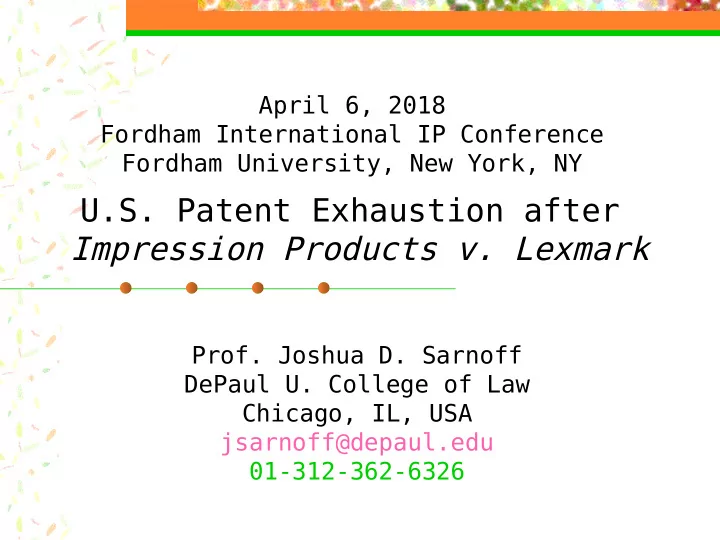

April 6, 2018 Fordham International IP Conference Fordham University, New York, NY U.S. Patent Exhaustion after Impression Products v. Lexmark Prof. Joshua D. Sarnoff DePaul U. College of Law Chicago, IL, USA jsarnoff@depaul.edu 01-312-362-6326
Impression Products, Inc. v. Lexmark Int’l, Inc., 137 S.Ct. 1523 (2017) • Patent exhaustion by “sale” is automatic and is unconditional: “We conclude that a patentee’s decision to sell a product exhausts all of its patent rights in that item, regardless of any restrictions the patentee purports to impose or the location of the sale.” (emphasis added)
Impression Products, Inc. v. Lexmark Int’l, Inc., 137 S.Ct. 1523 (2017) • Patent exhaustion is “automatic” for a “sale” “The limit functions automatically. When a patentee chooses to sell an item, that product ‘is no longer within the limits of the monopoly’….” • Patent exhaustion for a “sale” cannot be overridden jor prevented through contractual conditions or restrictions “patent exhaustion applies even when a sale is subject to an express, otherwise lawful restriction….”
Impression Products, Inc. v. Lexmark Int’l, Inc., 137 S.Ct. 1523 (2017) • Exhaustion is not (or is no longer) a form of “implied license” “The misstep in this [Federal Circuit] logic [that a sale is only a presumptively grant of authority] is that the exhaustion doctrine is not a presumption about the authority that comes along with a sale; it is instead a limit on ‘the scope of the patentee’s rights .’” (emphasis added) • Overruled 25 years of settled practices Mallinckrodt, Inc. v. Medipart, Inc., 976 F.2d 700 (1992), upheld "license” restrictions under patent law under the General Talking Pictures precedent
Impression Products, Inc. v. Lexmark Int’l, Inc., 137 S.Ct. 1523 (2017) • Patent holders may not impose patent restrictions on purchasers through licenses (suggesting no “use-only” “purchaser” licenses, and leaving uncertain the status of possession transfers as “sales”–e.g., leases) “This [restriction from General Talking Pictures that purchasers can be sued in patent law when knowingly participating in sales by licensees outside of license terms] does not mean that patentees can use licenses to impose post-sale restraints on purchasers.” “Exhaustion does not depend on…the type of rights that buyers expect to receive. As a result, restrictions … are irrelevant; what matters is the patentee’s decision to make a sale.”
Impression Products, Inc. v. Lexmark Int’l, Inc., 137 S.Ct. 1523 (2017) • Rather than implied license, patent exhaustion is federal statutory policy (or at least federally approved common law) “Congress enacted and has repeatedly revised the Patent Act against the backdrop of the hostility toward restraints on alienation. That enmity is reflected in the exhaustion doctrine.” “ Exhaustion is a separate limit on the patent grant, and does not depend on the patentee receiving some undefined premium for selling the right to access the American market. A purchaser buys an item, not patent rights.”
Impression Products, Inc. v. Lexmark Int’l, Inc., 137 S.Ct. 1523 (2017) • Nevertheless, the Court stated that patent holders may enforce contract remedies “ Once sold, the Return Program cartridges passed outside of the patent monopoly, and whatever rights Lexmark retained are a matter of the contracts with its purchasers, not the patent law.” ” Exhaustion does not arise because of the parties’ expectations about how sales transfer patent rights. More is at stake when it comes to patents than simply the dealings between the parties, which can be addressed through contract law.”
Unless … Preemption, Misuse, or Antitrust Violations • The only way that exhaustion can be automatic in preventing patent infringement is by preempting the contractual conditions that would deny the purchaser “authority” to make, use, etc. (precluding infringement) • The very same conditions are those that the patentee seeks to be enforce under contract law • Such contractual conditions thus may interfere with the “purposes and objectives” of patent law, and thus be preempted under the “Supremacy Clause” of the Constitution • Such “hateful to the law” conditions are arguably “illegal” and actionable as patent misuse and under antitrust law after FTC v. Actavis, 1 33 S.Ct. 2223 (2013)
Impression Products, Inc. v. Lexmark Int’l, Inc., 137 S.Ct. 1523 (2017) • Exhaustion also applies to international sales so long as “authorized,” so no right to prohibit import attaches to goods subject to an “authorized sale” “An authorized sale outside the United States, just as one within the United States, exhausts all rights under the Patent Act.” • Overruled Jazz Photo Corp. v. I.T.C., 264 F.3d 1094 (2001), where domestic right cannot be exhausated by foreign sales, and rejected U.S. Government’s “express reservation” approach “These sparse and inconsistent decisions provide no basis for any expectation, let alone a settled one, that patentees can reserve patent rights when they sell abroad.”
Forthcoming Cambridge U. Press Book on Comparative Exhaustion EXHAUSTING INTELLECTUAL PROPERTY RIGHTS: A Comparative Law and Policy Analysis Shubha Ghosh, Crandall Melvin Professor of Law, Director, IP & Technology Commercialization Law Curricular Program, Syracuse Intellectual Property Law Institute (SIPLI), Syracuse University College of Law Irene Calboli, Professor of Law, Texas A&M Law School, Transatlantic Technology Law Fellow, Stanford Law School
QUESTIONS? ??????????????????????????????? ??????????????????????????????? ??????????????????????????????? ??????????????????????????????? ??????????????????????????????? ??????????????????????????????? ??????????????????????????????? ??????????????????????????????? ??????????????????????????????? ???????????????????????????
Recommend
More recommend